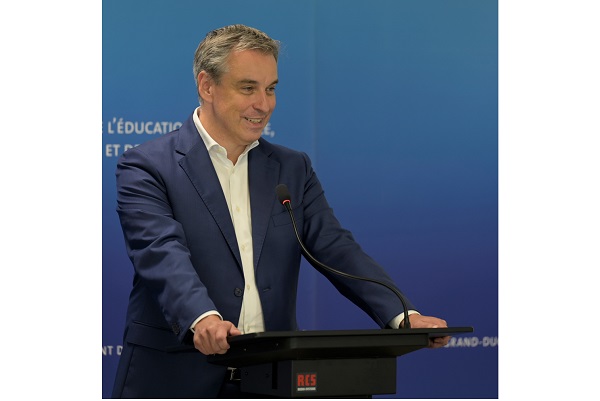 Claude Meisch, Luxembourg's Minister of Education, Children and Youth;
Credit: MENJE
Claude Meisch, Luxembourg's Minister of Education, Children and Youth;
Credit: MENJE
On Thursday 7 September 2023, Luxembourg's Minister of Education, Children and Youth, Claude Meisch, presented his report on the challenges and achievements of his ministry over the past five years (ahead of the next legislative elections).
Minister Meisch noted that the period (2018-2023) had been marked by many challenges, linked not only to the need to adapt educational policy to the constant evolution of the societal, economic, technological and scientific environment, but also to exceptional hardships such as the COVID-19 pandemic or the schooling of Ukrainian refugee children.
He said that despite these crises, Luxembourg's Ministry of Education, Children and Youth had managed to achieve "important milestones for education and reception of quality accessible to all."
Languages
He particularly highlighted efforts made in language teaching. In primary education, a new, more "playful" and "participative" method of teaching French has been introduced and extended. The establishment of a multilingual school offer for an increasingly heterogeneous population - Luxembourg receives some 4,000 pupils from other countries every year - was also the main motivation for the creation of public European schools, five of which opened their doors during the period in question.
Minister Meisch also noted the introduction of classes with a specific language regime and the expansion of the vocational training qualification offer, of which 44 training courses are now also available in French and seven in English.
Another highlight in this area, according to the minister, was the launch of a pilot project for literacy in French. In four primary schools, parents can choose whether they want their child to be taught in German or French. The pilot project is expected to be extended to all primary schools over the coming years.
Digital skills
Luxembourg's Education Minister also pointed out various advances in the area of digitalisation. "Five years ago, we did not have systematic provision of computer courses in schools. We are now systematically familiarising primary students with coding, the language of the digital world, and we have introduced the digital sciences course in the lower classes of secondary education," he said.
The skills necessary to evolve in the world of the 21st century, from the understanding and use of digital technologies to creativity, interpersonal communication and teamwork, will be further anchored in a new study plan for the primary education. More than 1,200 teachers and other education professionals, parents and students took part in a broad consultation process which began in 2020. According to Minister Meisch, the implementation of the new study plan by 2025 will be an important project in the coming years.
Investment in the quality of formal and non-formal education
Minister Meisch noted that the past five years have also been marked by significant investments in the quality of formal and non-formal education. "We have been able to strengthen the staff quantitatively and qualitatively," he elaborated. Between 2017 and 2021, the number of students increased by 4.1%, whilst the number of professionals involved in education (teachers, educators, specialised staff) increased by 11.8%. Moreover, since 2017/2018, more than 900 full-time staff have been recruited in the field of services for children with special educational needs; the rate of primary level teachers holding a bachelor's degree increased from 87% to 96% between 2017 and 2023.
In addition, in 2022, the 32 regional agents responsible for monitoring the quality of non-formal education carried out 8,989 visits to crèches, "maisons relais" (childminding services) and youth centres. 3,219 educational concepts in the sector were drawn up in 2022, while actors in the non-formal sector received 9,374 hours of free continuing education in 2022.
Luxembourg's Education Minister also highlighted the government's efforts to increase families' accessibility to quality education, child and youth services: free "maisons relais" during school weeks, free lunches in primary schools, secondary school meal rates scaled according to the financial situation of households, mostly free music education, 20 hours of free daycare and free school books, among others.
He concluded by reflecting once again on the various "milestones" of the past five years, adding that "the education system must continue to adapt to the evolution of society at a sustained pace."








